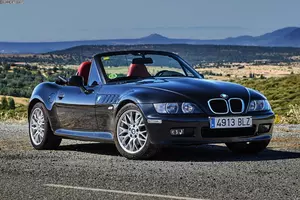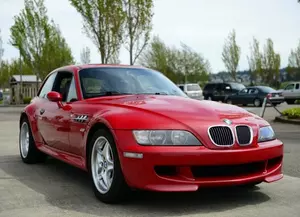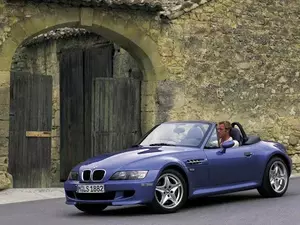
| Vehicle | Curb weight | Difference from world's smallest | Weight to power ratio | 0—60 mph acceleration ratio | Consumption ratio |
|---|---|---|---|---|---|
| 1.9 |
1220 kg / 2690 lbs |
795 kg (1753 lbs) heavier | 10 kg to 1 hp | 123 kg/s (271 lbs/s) | - |
| 2.8 |
1285 kg / 2833 lbs |
860 kg (1896 lbs) heavier | 7 kg to 1 hp | 195 kg/s (430 lbs/s) | - |
| 2.2i |
1345 kg / 2966 lbs |
920 kg (2029 lbs) heavier | 8 kg to 1 hp | 179 kg/s (395 lbs/s) |
146 kg/L (322 lbs/L) |
| 1.8 |
1160 kg / 2558 lbs |
735 kg (1621 lbs) heavier | 10 kg to 1 hp | 116 kg/s (256 lbs/s) | - |
| 2.0 |
1270 kg / 2800 lbs |
845 kg (1863 lbs) heavier | 8 kg to 1 hp | 149 kg/s (329 lbs/s) | - |
| 3.0i |
1305 kg / 2878 lbs |
880 kg (1941 lbs) heavier | 6 kg to 1 hp | 229 kg/s (505 lbs/s) | - |
| Vehicle | 1.9 |
|---|---|
| Curb weight |
1220 kg / 2690 lbs |
| Difference from world's smallest | 795 kg (795 lbs) heavier |
| Weight to power ratio | 10 kg to 1 hp |
| 0—60 mph acceleration ratio | 123 kg/s (271 lbs/s) |
| Consumption ratio | - |
| Vehicle | 2.8 |
| Curb weight |
1285 kg / 2833 lbs |
| Difference from world's smallest | 860 kg (860 lbs) heavier |
| Weight to power ratio | 7 kg to 1 hp |
| 0—60 mph acceleration ratio | 195 kg/s (430 lbs/s) |
| Consumption ratio | - |
| Vehicle | 2.2i |
| Curb weight |
1345 kg / 2966 lbs |
| Difference from world's smallest | 920 kg (920 lbs) heavier |
| Weight to power ratio | 8 kg to 1 hp |
| 0—60 mph acceleration ratio | 179 kg/s (395 lbs/s) |
| Consumption ratio |
146 kg/L (322 lbs/L) |
| Vehicle | 1.8 |
| Curb weight |
1160 kg / 2558 lbs |
| Difference from world's smallest | 735 kg (735 lbs) heavier |
| Weight to power ratio | 10 kg to 1 hp |
| 0—60 mph acceleration ratio | 116 kg/s (256 lbs/s) |
| Consumption ratio | - |
| Vehicle | 2.0 |
| Curb weight |
1270 kg / 2800 lbs |
| Difference from world's smallest | 845 kg (845 lbs) heavier |
| Weight to power ratio | 8 kg to 1 hp |
| 0—60 mph acceleration ratio | 149 kg/s (329 lbs/s) |
| Consumption ratio | - |
| Vehicle | 3.0i |
| Curb weight |
1305 kg / 2878 lbs |
| Difference from world's smallest | 880 kg (880 lbs) heavier |
| Weight to power ratio | 6 kg to 1 hp |
| 0—60 mph acceleration ratio | 229 kg/s (505 lbs/s) |
| Consumption ratio | - |

| Vehicle | Curb weight | Difference from world's smallest | Weight to power ratio | 0—60 mph acceleration ratio | Consumption ratio |
|---|---|---|---|---|---|
| 2.8 |
1300 kg / 2867 lbs |
875 kg (1930 lbs) heavier | 7 kg to 1 hp | 200 kg/s (441 lbs/s) | - |
| 3.0i |
1305 kg / 2878 lbs |
880 kg (1941 lbs) heavier | 6 kg to 1 hp | 229 kg/s (505 lbs/s) |
137 kg/L (302 lbs/L) |
| 3.2 |
1390 kg / 3065 lbs |
965 kg (2128 lbs) heavier | 4 kg to 1 hp | 273 kg/s (602 lbs/s) | - |
| Vehicle | 2.8 |
|---|---|
| Curb weight |
1300 kg / 2867 lbs |
| Difference from world's smallest | 875 kg (875 lbs) heavier |
| Weight to power ratio | 7 kg to 1 hp |
| 0—60 mph acceleration ratio | 200 kg/s (441 lbs/s) |
| Consumption ratio | - |
| Vehicle | 3.0i |
| Curb weight |
1305 kg / 2878 lbs |
| Difference from world's smallest | 880 kg (880 lbs) heavier |
| Weight to power ratio | 6 kg to 1 hp |
| 0—60 mph acceleration ratio | 229 kg/s (505 lbs/s) |
| Consumption ratio |
137 kg/L (302 lbs/L) |
| Vehicle | 3.2 |
| Curb weight |
1390 kg / 3065 lbs |
| Difference from world's smallest | 965 kg (965 lbs) heavier |
| Weight to power ratio | 4 kg to 1 hp |
| 0—60 mph acceleration ratio | 273 kg/s (602 lbs/s) |
| Consumption ratio | - |

| Vehicle | Curb weight | Difference from world's smallest | Weight to power ratio | 0—60 mph acceleration ratio | Consumption ratio |
|---|---|---|---|---|---|
| 3.2 |
1375 kg / 3032 lbs |
950 kg (2095 lbs) heavier | 4 kg to 1 hp | 275 kg/s (606 lbs/s) | - |
| Vehicle | 3.2 |
|---|---|
| Curb weight |
1375 kg / 3032 lbs |
| Difference from world's smallest | 950 kg (950 lbs) heavier |
| Weight to power ratio | 4 kg to 1 hp |
| 0—60 mph acceleration ratio | 275 kg/s (606 lbs/s) |
| Consumption ratio | - |

| Vehicle | Curb weight | Difference from world's smallest | Weight to power ratio | 0—60 mph acceleration ratio | Consumption ratio |
|---|---|---|---|---|---|
| 3.2 |
1450 kg / 3197 lbs |
1025 kg (2260 lbs) heavier | 4 kg to 1 hp | 290 kg/s (639 lbs/s) | - |
| Vehicle | 3.2 |
|---|---|
| Curb weight |
1450 kg / 3197 lbs |
| Difference from world's smallest | 1025 kg (1025 lbs) heavier |
| Weight to power ratio | 4 kg to 1 hp |
| 0—60 mph acceleration ratio | 290 kg/s (639 lbs/s) |
| Consumption ratio | - |